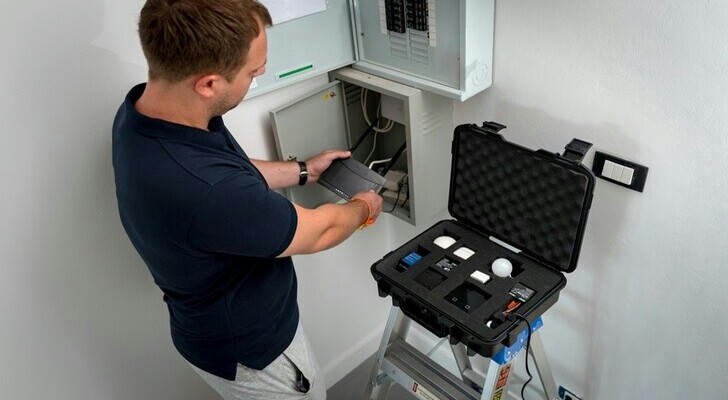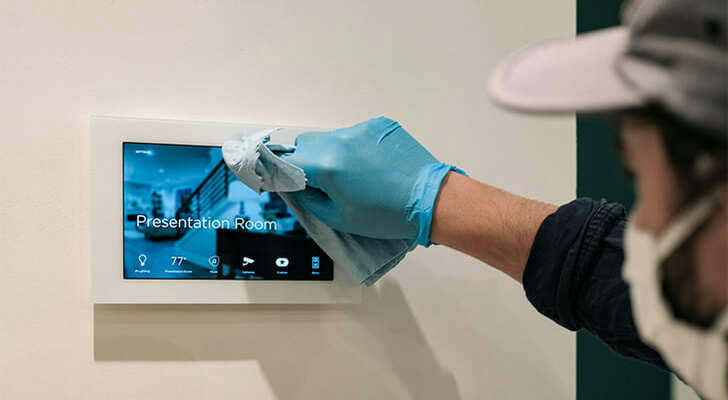Smart Home Installer Training
In today’s world of smartphones, smartwatches, and smart cars, it’s no surprise that homes have also joined the trend of smart technology in recent years. However, successfully upgrading a home to a smart home requires the expertise of a professional smart home installer.
Smart home technology represents a significant evolution in how we interact with our living spaces. At its core, it involves a network of devices and systems that can be controlled remotely or programmed to operate autonomously. Key features include automation, remote monitoring, and enhanced security, all of which contribute to greater convenience, energy efficiency, safety, and increased property value. This is your window of opportunity—now is the time to explore smart home installation training and why it’s worth pursuing.

Overview
Smart home systems typically include components such as:
- Smart lighting
- Thermostats
- Security cameras
- Door locks
- Appliances
These devices are interconnected through the Internet of Things (IoT), allowing homeowners to manage their home’s functions via a central hub or mobile app. The integration of artificial intelligence (AI) further enhances these systems, enabling them to learn user preferences and adapt accordingly, creating a more personalized living experience.
Typical Tasks and Duties of a Smart Home Installer
The role of a smart home installer is multifaceted, requiring a combination of technical expertise and customer service skills.
Primary Responsibilities:
- Assessing client needs.
- Designing smart home systems.
- Executing installations.
Daily Tasks:
- Troubleshooting issues.
- Conducting system tests.
- Providing clients with guidance on system usage.
Essential Technical Skills:
- Understanding of wiring and circuit design.
- Knowledge of network configurations.
- Staying updated on the latest technologies and trends.
Three Best Ways to Obtain Training
Aspiring smart home installers have several pathways to acquire the necessary training and skills:
1. Vocational Programs
- Duration: A few months to a year.
- Topics Covered: Electrical systems, device integration, and customer service.
- Outcome: Graduates often receive a certificate that enhances employability.
2. Industry Certifications
- Certifying Bodies: Custom Electronics Design and Installation Association (CEDIA) or Electronic Security Association (ESA).
- Components: Theoretical and practical training.
- Benefits: Validates expertise and commitment to the field.
3. On-the-Job Apprenticeships
- Duration: Six months to two years.
- Benefits: Hands-on experience and mentorship from experienced professionals.
Employment Outlook and Career Growth
The employment outlook for smart home installers is promising, driven by the increasing adoption of smart home technologies among consumers.
Key Statistics:
- The smart home market is projected to grow at a compound annual growth rate (CAGR) of over 25% in the coming years.
Career Advancement Opportunities:
- Specialization: Focus on areas like security systems or energy management.
- Supervisory Roles: Oversee installation teams and manage projects.
- Entrepreneurship: Start a business focused on smart home installations.

Job Suitability
Certain personal qualities and skills are essential for success as a smart home installer:
Key Qualities:
- Strong problem-solving abilities.
- Attention to detail.
- Effective communication skills.
Work Environment:
- Residential settings, often involving tight spaces and working at heights.
- Physical stamina required for lifting heavy equipment and standing for long periods.
Daily Challenges:
- Troubleshooting technical issues.
- Managing client expectations.
- Adapting to new technologies.
Tips for Becoming a Successful Smart Home Installer
To thrive in the smart home installation industry, aspiring professionals should:
Engage in Ongoing Education:
- Participate in workshops, online courses, and industry conferences.
Build a Professional Network:
- Join industry associations and attend local trade shows.
Prioritize Customer Service:
- Communicate effectively with clients to build trust and secure repeat business.
Stay Informed:
- Keep up with industry trends through publications and online resources.
Final Thoughts
A career as a smart home installer offers a unique blend of technical challenges and opportunities for personal and professional growth. With the increasing demand for smart home technology, individuals entering this field can expect a rewarding career with ample opportunities for advancement.
As smart homes become more prevalent, the role of the installer will be crucial in ensuring these systems are effectively integrated and maintained. Embracing the future of home automation can lead to a fulfilling and prosperous career in smart home installation.
